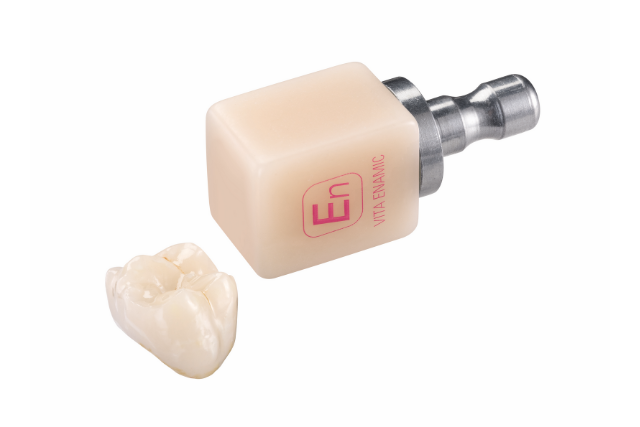VITA ENAMIC® ST
VITA ENAMIC® ST: The inlay with the chameleon effect
If you are looking for the perfect inlay material for everyday practice, look no further than VITA ENAMIC ST. The super translucent CAD/CAM block for efficient chair-side treatment is based on the clinically proven hybrid ceramic blueprint, which has been in use since 2013. Under pressure and heat, a porous pre-sintered fine structure feldspar ceramic block (86% by weight) is infiltrated with a polymer (14% by weight). The dual network also offers clear advantages with regard to inlay treatment: the minimum layer thickness in the isthmus range is only one millimeter, which allows for a minimally invasive and defect-oriented preparation. The precise edges and the excellent edge stability ensure a perfect fit. Firing is not required. After grinding, the restoration is finished and polished, and it is then ready for integration. If desired, the light-curing stains from the VITA ENAMIC STAINS kit can also be used for individualization and glazing.
VITA ENAMIC ST hybrid ceramic – everything else is just composite
Due to the dominant ceramic network, the material can be etched and silanized in the usual way with hydrofluoric acid. This not only leads to the best adhesion values when fully adhesive bonding is used, but also saves the need to purchase a sand blasting unit, as is the required for CAD/CAM composite blocks. A dual network as with VITA ENAMIC does not exist with highly filled composites: they are made with glass or ceramic fillers embedded in a polymer matrix in the familiar manner. To apply the term hybrid ceramic to these materials is therefore misleading.
VITA ENAMIC ST is primarily suitable for all restorations limited by enamel: inlays, onlays and table tops.
Advantages
VITA ENAMIC ST
- Super-translucent CAD / CAM block
- Minimum layer thickness in the isthmus range is only one millimeter
- Precise margins and outstanding edge stability
- Firing is not necessary. After grinding, finishing and polishing are carried out
- The material can be etched and silanized with hydrofluoric acid thanks to the dominant ceramic network
